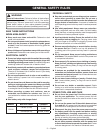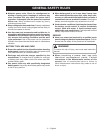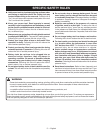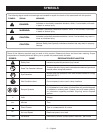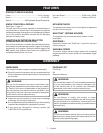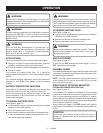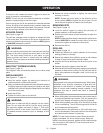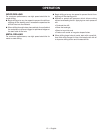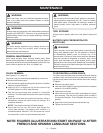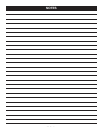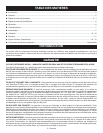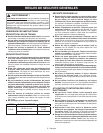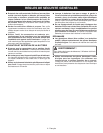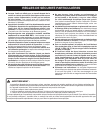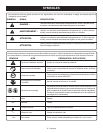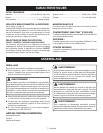
11 — English
TO RETIGHTEN A LOOSE CHUCK
The chuck may become loose on the spindle and develop
a wobble. Also, the chuck screw may become loose, caus-
ing the chuck jaws to bind and prevent them from closing.
To tighten:
Remove the battery pack.
Lock the switch trigger by placing the direction of rotation
selector in the center position.
Open the chuck jaws.
Insert the hex key into the chuck and tighten the chuck
jaws securely. Tap the hex key sharply with a mallet in
a clockwise direction. This will tighten the chuck on the
spindle.
Open the chuck jaws and remove the hex key.
Tighten the chuck screw.
MAINTENANCE
CHUCK REMOVAL
See Figures 9 - 11, page 13.
The chuck may be removed and replaced by a new one.
Remove the battery pack.
Lock the switch trigger by placing the direction of rotation
selector in center position.
Insert a 5/16 in. or larger hex key into the chuck of the
drill and tighten the chuck jaws securely.
Tap the hex key sharply with a mallet in a clockwise
direction. This will loosen the screw in the chuck for easy
removal.
Open the chuck jaws and remove the hex key. Using a
screwdriver, remove the chuck screw by turning it in a
clockwise direction.
NOTE: The chuck screw has left hand threads.
Insert the hex key into the chuck and tighten the
chuck jaws securely. Tap sharply with a mallet in a
counterclockwise direction. This will loosen the chuck
on the spindle. It can now be unscrewed by hand.
NOTE: FIGURES (ILLUSTRATIONS) START ON PAGE 12 AFTER
FRENCH AND SPANISH LANGUAGE SECTIONS.
WARNING:
When servicing, use only identical replacement parts.
Use of any other parts may create a hazard or cause
product damage.
WARNING:
Always wear eye protection with side sheilds marked to
comply with ANSI Z87.1. Failure to do so could result in
objects being thrown into your eyes, resulting in serious
personal injury.
WARNING:
To avoid serious personal injury, always remove the
battery pack from the product when cleaning or
performing any maintenance.
GENERAL MAINTENANCE
Avoid using solvents when cleaning plastic parts. Most
plastics are susceptible to damage from various types of
commercial solvents and may be damaged by their use. Use
clean cloths to remove dirt, dust, oil, grease, etc.
WARNING:
Do not at any time let brake fluids, gasoline, petroleum-
based products, penetrating oils, etc., come in contact
with plastic parts. Chemicals can damage, weaken or
destroy plastic which may result in serious personal
injury.
TOOL STORAGE
Always remove battery pack from tool before storing the
tool.
BATTERY PACK PREPARATION FOR
RECYCLING
WARNING:
Upon removal, cover the battery pack’s terminals with
heavy-duty adhesive tape. Do not attempt to destroy
or disassemble battery pack or remove any of its
components. Lithium-ion and nickel-cadmium batteries
must be recycled or disposed of properly. Also, never
touch both terminals with metal objects and/or body
parts as short circuit may result. Keep away from children.
Failure to comply with these warnings could result in fire
and/or serious injury.



